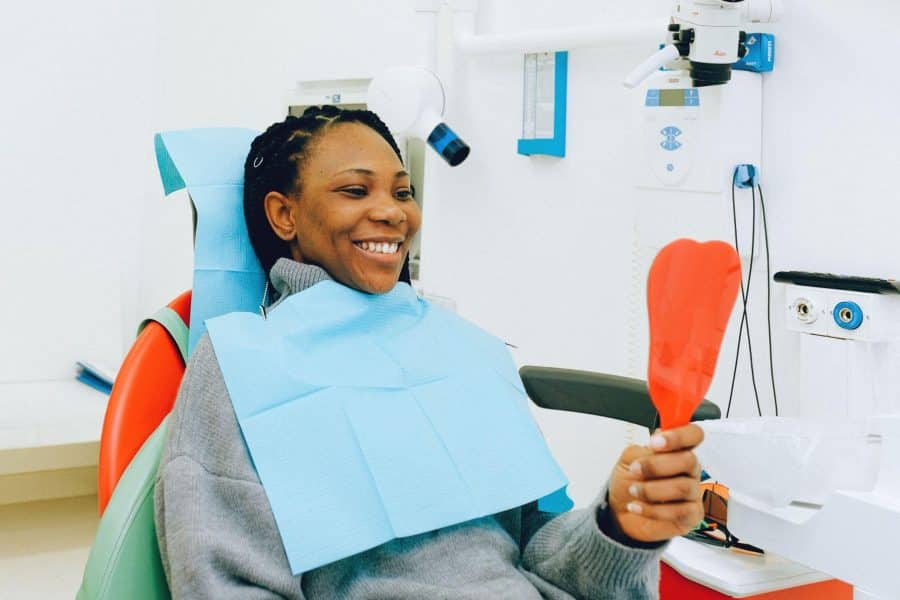- Soft Diet
- Speech Practice
- Let Your Gums Rest
- Try Using Adhesives
- Dentist Visits
- Maintain Oral Hygiene
- How to Clean Your Dentures
- Takeaway
Your smile is essential. A simple smile boosts self-esteem and improves how others perceive us in social and professional settings. However, when your teeth get extracted due to age or decay, it is time for you to find a replacement. After all, your teeth help you keep your confident smile, allow you to enjoy your meals, and speak without difficulty. You can check out this dentist in turlock to bleach your teeth if they get yellow.
Dental implants, which are now the standard option for younger people, can replace extracted teeth. However, if you are part of the older age group or cannot have them due to medical reasons, you will most likely wear partial or complete dentures.
Dentures can be just as strong as regular teeth and they can be good replacements too. If you’re wearing dentures for the first time, then this guide will definitely help you get used with your new set of chompers:
Soft Diet
After getting your dentures in clinics like Skygate Dental in Brisbane, adjustment to eating may be a little tricky, but you have to be patient. Despite the challenge, you should not sacrifice healthy eating foods during this phase. Remember, healthy and soft food. You can start with warm soups or even mashed potatoes.
Eating soft food can help make the transition with using dentures go more smoothly. Due to your gums or other parts of your mouth getting sore, your diet might get affected. To avoid losing your appetite and having a painful experience while eating, it’s better to go for specially prepared food while getting used to or recovering from any dental procedures.
Speech Practice
Believe it or not, singing can help you get used to your new dentures. While wearing your new dentures, try singing your favorite tunes. Singing can help you articulate words efficiently while wearing your dentures.
If you are not a singing type, don't worry. You can also practice speaking comfortably with your new dentures by reading out loud. You can also try looking in the mirror and exercise your facial muscles while getting used to wearing dentures.
Let Your Gums Rest
It is essential to give your gums rest by removing your dentures at night to relieve them of the constant pressure. Remove your dentures periodically, perhaps every two to four hours for the first week, to give your gums, jaw, and mouth a rest.
Again, this will prevent gum irritation and allow you to rest your facial muscles. Next, take your dentures out at night and place them in a glass of mild cleaning solution or water if they are fully detachable. Make sure to clean it thoroughly with running water before putting it back in your mouth when you wake up.
Try Using Adhesives
Some dentures aren't held in place by an implant or a bridge, that’s why most people can remove them easily. However, there are cases where dentures can get loose. A simple action like talking constantly can easily dislodge dentures in some people, causing an embarrassing situation.
If you feel your dentures aren’t fitting anymore, you can try using denture adhesives. Adhesives can be pastes, powders or even pads that can be placed on your dentures so that it’ll stay in place. These adhesives can contain zinc which can help with adhesion even more. In most cases, you should always consult with your dentist if your dentures are constantly falling out even with the help of adhesives.
Dentist Visits
Do not forget your dental checkups after an initial couple of months of using your new dentures. Although you have a new set of teeth, you must maintain your regular checkups. During the appointments, you can talk with your dentist to address if you feel any discomfort.
While attending your consultations, take any medicine given by your dentist since making all appropriate improvements will assist lessen your discomfort throughout the transitional stage.
Maintain Oral Hygiene
When you don't have natural teeth, it's easy to neglect oral hygiene. To maintain good hygiene, you will need to wash and brush your gums daily and use mouthwash during the first several weeks of using your denture.
Remember, Dentures, like natural teeth, can accumulate tartar and stains. Moreover, clean your dentures regularly to prevent oral problems. Washing your dentures will keep them odor-free.
How to Clean Your Dentures
Brush your dentures every day in the same way you would brush your teeth, with one important exception: no toothpaste. Many brands of toothpaste can cause denture damage. So instead, brush all surfaces of the dentures with a soft-bristled toothbrush.
After each meal, rinse your dentures with water. You can soak dentures in denture cleaners, but soaking is not a substitute for brushing. You must still brush the dentures to remove plaque. Here's are the Tips on Maintaining Your Dentures
Takeaway
Remember that many folks also adjusted and adapted to wearing dentures, and after adapting, they experience betterment in their well-being. So with the help of these tips, for sure you'll be able to enjoy eating and conversing without difficulties.

